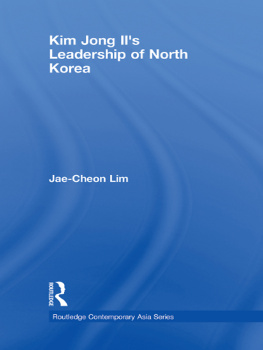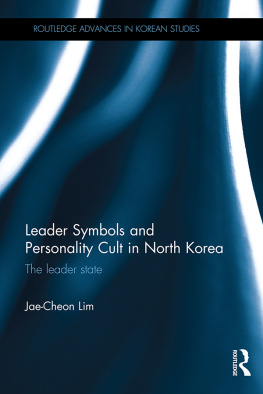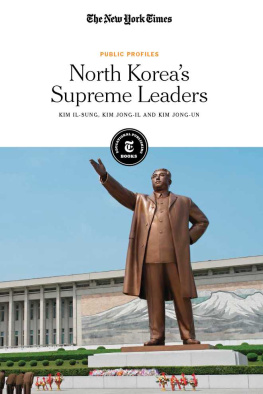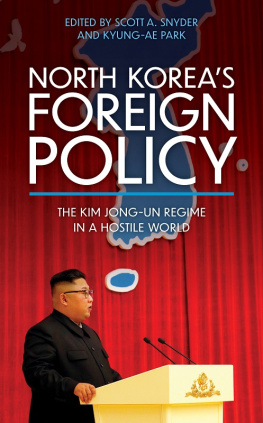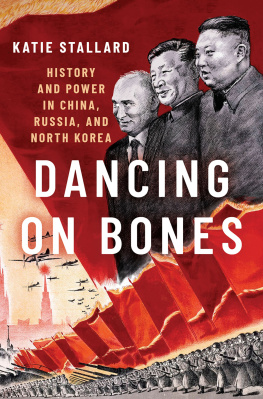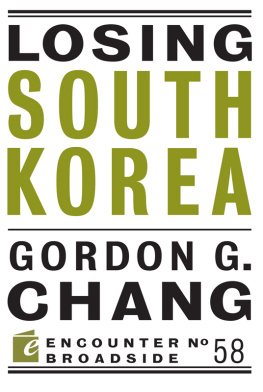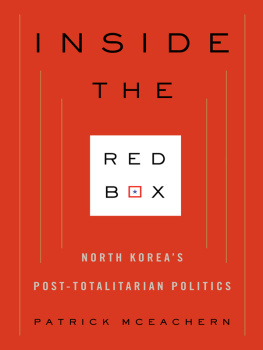Kim Jong Ils Leadership of North Korea
Kim Jong Il came to power after the death of his father Kim Il Sung in 1994. Contrary to expectations, he has succeeded in maintaining enough political stability to remain in power. Kim Jong Ils Leadership of North Korea is an examination of how political power has been developed, transmitted from father to son, and now operates in North Korea.
Using a variety of original North Korean sources as well as South Korean materials Jae-Cheon Lim pieces together the ostensibly contradictory and inconsistent facts into a conceptual coherent framework. This book considers Kim and his leadership through an analytical framework composed of four main elements: (i) Kim as a leader of a totalitarian society; (ii) as a politician; (iii) as a Korean; and (iv) as an individual person.
This illuminating account of what constitutes power and how it is used makes an important contribution to the understanding of an opaque and difficult regime. It will be of interest for upper-level undergraduates, postgraduates, and academics interested in North Korean politics, and also those in Political Theory.
Jae-Cheon Lim is a researcher at the Institute for Korean Unification Studies, Yonsei University.
Routledge contemporary Asia series
- Taiwan and Post-Communist Europe
Shopping for allies
Czeslaw Tubilewicz
- The Asia-Europe Meeting
The theory and practice of interregionalism
Alfredo C. Robles, Jr
- Islamic Legitimacy in a Plural Asia
Edited by Anthony Reid and Michael Gilsenan
- Asian-European Relations
Building blocks for global governance?
Edited by Jrgen Rland, Gunter Schubert, Gnter Schucher and Cornelia Storz
- 5 Taiwans Environmental Struggle
Toward a green silicon island
Jack F. Williams and Ch'ang-yi David Chang
- Taiwans Relations with Mainland China
A tail wagging two dogs
Su Chi
- The Politics of Civic Space in Asia
Building urban communities
Edited by Amrita Daniere and Mike Douglass
- Trade and Contemporary Society Along the Silk Road
An ethno-history of Ladakh
Jacqueline Fewkes
- Lessons from the Asian Financial Crisis
Edited by Richard Carney
- Kim Jong Ils Leadership of North Korea
Jae-Cheon Lim
Kim Jong Ils Leadership of North Korea
Jae-Cheon Lim
First published 2009
by Routledge
2 Park Square, Milton Park, Abingdon, Oxon OX14 5RN
Simultaneously published in the USA and Canada
by Routledge
29 West 35th Street, New York, NY 10001
Routledge is an imprint of the Taylor & Francis Group,an informa business
This edition published in the Taylor & Francis e-Library, 2008.
To purchase your own copy of this or any of Taylor & Francis or Routledges collection of thousands of eBooks please go to www.eBookstore.tandf.co.uk.
2009 Jae-Cheon Lim
Typeset in Times New Roman by Keyword Group Ltd
Printed and bound in Great Britain by TJI Digital, Padstow, Cornwall
All rights reserved. No part of this book may be reprinted or reproduced or utilised in any form or by any electronic, mechanical, or other means, now known or hereafter invented, including photocopying and recording, or in any information storage or retrieval system, without permission in writing from the publishers.
British Library Cataloguing in Publication Data
A catalogue record for this book is available from the British Library
Library of Congress Cataloging in Publication Data
A catalog record has been requested for this book
ISBN 0-203-88472-8 Master e-book ISBN
ISBN10 0-415-48195-3 (hbk)
ISBN10 0-203-88472-8 (ebk)
ISBN13 978-0-415-48195-3 (hbk)
ISBN13 978-0-203-88472-0 (ebk)
Acknowledgments
This work was originally written as a doctoral dissertation. It could not have been produced without many peoples help. First of all, I would like to express my gratitude to my advisor Dae-Sook Suh. I owe him an immeasurable intellectual debt for his help to my master and doctoral studies at the University of Hawaii for six years. My appreciation also extends to John Wilson, Carolyn Stephenson, James A. Dator and Edward J. Shultz, the members of my dissertation committee. I benefited from their scholarship, advice, and encouragement throughout the research of Kim Jong Il and his leadership.
Many thanks to Jeffrey A. Tripp and Kristine Kotecki for reading my book meticulously. I am particularly indebted to Jeffrey and his wife, Sujin Hwang Tripp, for helping me adjust to American life and fueling my research with great food. I appreciate Son Kwang-ju and Chng Ch'ang-hyn whose expertise on Kim Jong Il helped this research. I am also grateful to Haksoon Paik and the employees of t'ongilbu charyo cent' (Archives Center of the Ministry of Unification) who kindly allowed me to copy documents on Kim Jong Il and North Korea.
Intellectual discussions with Eundak Kwon, Jungmin Seo, Mooweon Rhee and Mihyang Ahn will remain unforgettable memories, as will my friendships with Sung Jae Lee, Hyuncheol Kim, Chan Lee, Jihye Yeom, Sangyoung Park, Whi Chang, Jih-Un Kim, Hyeonju Son, You-jeong Lee, Joongho Kim, Yongseok Suh, Noa Matsushita, Shunichi Takekawa, and James Rae. I am additionally thankful to several people, including Eun Kook Lee, Yong Ho Kim, Kay-Soon Chang, Bum-Suk Kim, Yongsoon Kim, and Jae-Hong Hwang, at the Institute for Korean Unification Studies, Yonsei University, who discussed many Korean issues with me. I also feel obligated to express my deep gratitude to Jae Shik Sohn at the Graduate Institute of Peace Studies, Kyunghee University, who has been my mentor.
At Routledge, when my manuscript was delivered, Stephanie Rogers carefully read it and encouraged publication. I was lucky to have her wise counsel. Sonja van Leeuwen and Leanne Hinves also deserve my appreciation due to their assistance for this publication.
In addition, I owe a debt to my brother, sister, sister-in-law, brother-in-law, nephews and nieces for their support. Finally, my wholehearted gratitude goes to my father, mother, and wife Sun-hee whose unconditional love was the driving force for finishing this book. This book is dedicated to them.
Abbreviations
CCP Chinese Communist Party
CMAC Central Military Affairs Committee
DC Department of Culture
DEL Department of External Liaison
DUF Department of the United Front
DWU Democratic Womens Union
KIA Kaesng Industrial Area
LSWY League of Socialist Working Youth
MSC Military Security Command
NDC National Defense Commission
OD Operation Department
SKLB South Korean Liaison Bureau
SSD State Security Department
TRFM Three-Revolution Red Flag Movement
Introduction
Purpose
After the death of North Koreas founding leader Kim Il Sung in 1994, his son, Kim Jong Il, began to rule the state. He was little known to the outside world at the time. Experts on North Korea wondered whether Kim had the same power base and personal capacity to govern the state as his father had possessed. After the first leaders death, the second leader had to deal with the most difficult period in North Koreas history, the natural disasters and mass starvation of 19951998. Many people wondered how long Kim Jong Il could maintain the regime and whether a coup against the new totalitarian leader might soon result from his instatement.

